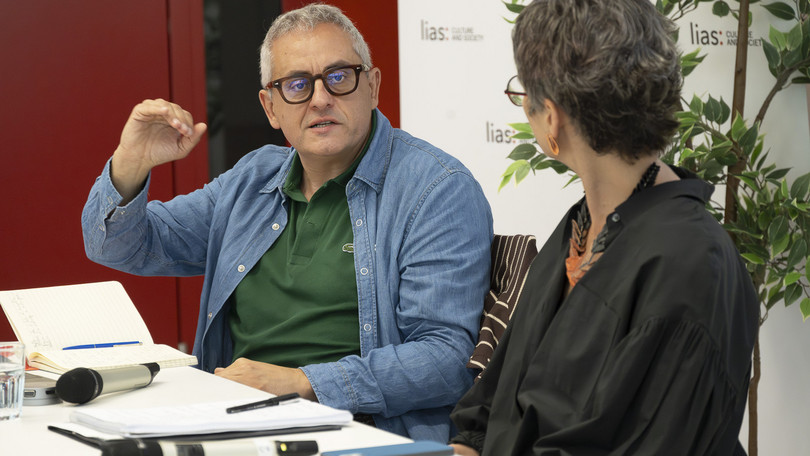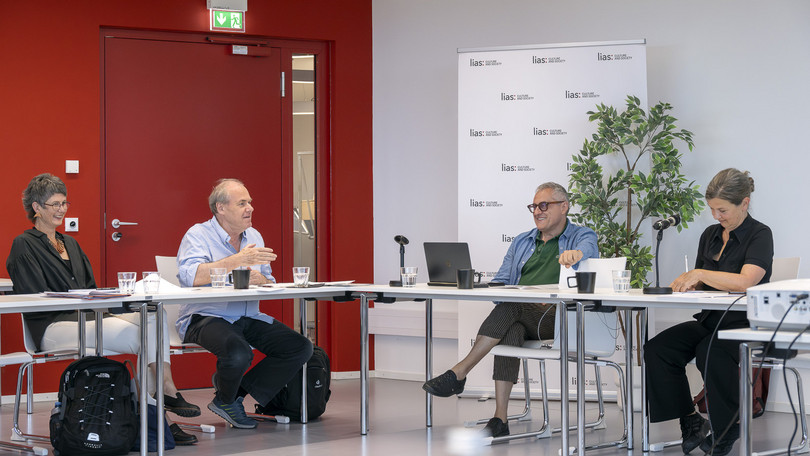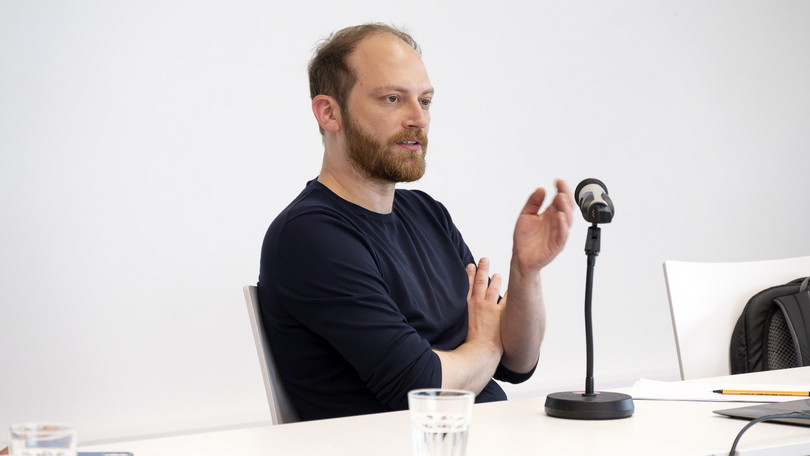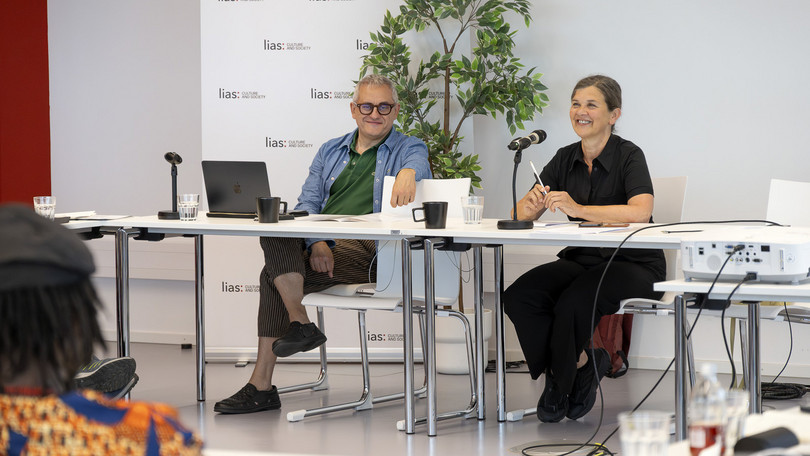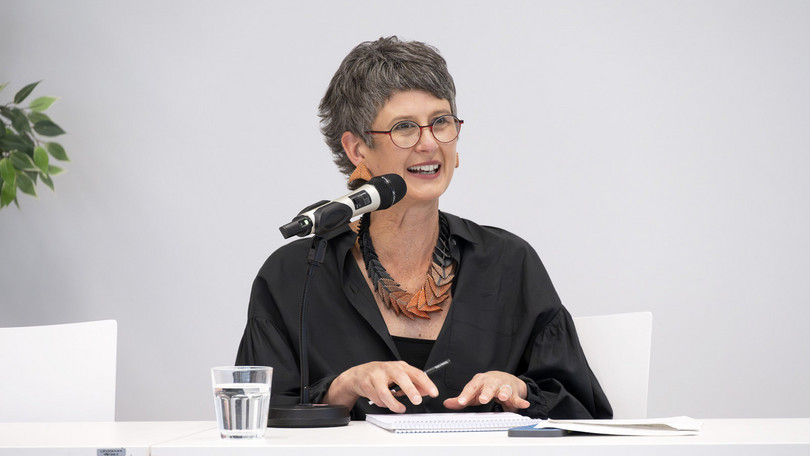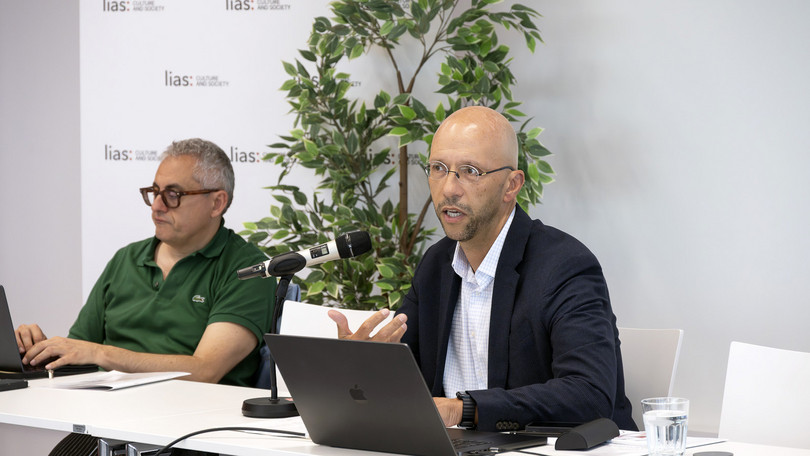LIAS Workshop »Power, Resistance, Fascism: Re-Reading Foucault in the Present«
Beyond Dictatorship: Micro-Fascism and Resistance in Foucault
2025-07-08
The workshop explored fascism not as a closed historical chapter but as a persistent configuration of power, desire, and subjectivation. Drawing on Michel Foucault's analytics of power, the high-profile panel examined how fascist logics operate across institutions, bodies, and everyday life. Through close readings and interdisciplinary dialogue, the sessions opened space for rethinking resistance, cruelty, and the politics of memory.
In his contribution „Foucault and Fascism: How to Fill an Empty Space” Roberto Nigro (Leuphana University) opened with an overview of Michel Foucault’s methodological approach, describing him as an archivist-historian working with philosophical fragments to explore systems of power and knowledge. Foucault was deeply engaged with ancient texts and the 18th–19th centuries, focusing on how modernity—particularly liberalism—gave rise to concepts such as biopolitics. Foucault’s analysis resists totalizing theories; rather, he explores practices of power and resistance, uncovering how violence and governance operate through subtle, often invisible, mechanisms.
Nigro emphasized that Foucault did not directly theorize fascism or Nazism but addressed the broader rationalities that enabled them. His critique of liberalism is key to understanding how biopolitical structures underlie both fascist and democratic regimes. Fascism, in this light, becomes a form of governance emerging from modern rationality.
Racism plays a central role in Foucault’s biopolitical framework, functioning as a “technology of killing” by creating biological divisions between populations—those who must live and those who may die. Fascism intensifies this logic, distributing power to enact violence through state and paramilitary institutions. The plebs or marginalized groups, often resisting classification, become entirely subjugated within fascist regimes.
Audience questions focused on universality, the role of the historian, and Foucault’s stance on fascism. The speaker clarified that Foucault rejected universals as fixed truths but not universality as a historical process. Foucault’s work does not propose moral codes but cultivates ethical practices grounded in critique and resistance. His life and scholarship were consistently anti-fascist, aimed at generating spaces of freedom.
Foucault did not theorize fascism directly but exposed the micro-practices and rationalities that enable it. His anti-fascism lies in method and ethos: resisting universal truths, analysing power, and fostering ethical life as freedom from domination.
In his lecture “Governmentality – A New Power After Fascism” LIAS Senior Fellow Alex Demirović (Goethe University Frankfurt on Main) opened by critically reflecting on the title of the presentation, describing it as misleading and his input as not complete—a sign of theoretical defeat when trying to approach fascism through the lens of Foucault. While using Foucault in relation to fascism may seem unusual, Demirović acknowledged his lasting empirical relevance. However, today’s discourse feels like a regression to the 1960s and 70s, where Freud and Marx dominated—Foucault is seldom integrated meaningfully.
Theoretical tools used to combat fascism and racism have, in Demirović’s view, largely failed. Despite strong democratic institutions, capitalist societies have undergone structural changes that Foucault tried to address. He pointed out that 19th-century struggles were perceived primarily through economic categories. Fascism, by contrast, deeply infiltrated the masses, fostering consent and self-activity—dynamics already observed by critical theory.
Fascism and Stalinism were viewed as singular phenomena. To grasp their emergence, one must explore subterranean mechanisms of power operating independently beneath the state apparatus. In the 1970s, Foucault argued that contemporary events did not represent a new fascism but something different: a novel power formation. He suggested fascism lacked the formal structure of constitutional states and that old conceptual tools had become obsolete.
Power, in Foucault’s analysis, shifted with the rise of neoliberalism. The state, for Foucault, had no interior essence and should not be taken as a given. Rather, he focused on resisting excessive governance—“the art of not being governed quite so much.” Neoliberalism reduced the visible power of the state while modifying internal dynamics. A new authoritarian configuration could emerge—combining democratic, liberal, and fascist tendencies. Fascism, like a fever, remains dormant and can resurface under new forms.
Demrović concluded, that Foucault helps us understand fascism not as a stable regime but as dispersed power rooted in modern governance. His focus on neoliberal transformations reveals how authoritarian tendencies adapt within democratic frameworks. Antifascism, therefore, must move beyond state-centric models and address deeper, shifting power logics.
The presentation of Jonas Oßwald “Introduction to the Non-Fascist Life: Foucault and the Problem of Power” explored Michel Foucault’s implicit engagement with fascism through his broader analytics of power. While Foucault rarely addressed fascism directly, he saw it not as a historical anomaly but as a persistent structural possibility within modern societies. Fascism, in his view, is defined by an intensification of dispersed power, not centralized authority. Unlike Gilles Deleuze and Félix Guattari, who emphasize unconscious desire, Foucault focuses on how fascism becomes desirable through societal participation in delegated power—what he calls microfascism.
Foucault avoids stable definitions of “the State” or “Fascism,” preferring genealogical analyses that emphasize historical flexibility. This approach reveals fascism as a haunting element of modern subjectivity, always latent in disciplinary and neoliberal societies. His method resists universal categories, offering instead an anti-fascist theory of power focused on relations, not essences.
The discussion acknowledged Foucault’s Eurocentric limitations, especially his archival focus and lack of direct engagement with colonialism. However, his concepts gesture toward colonial structures indirectly. Participants noted that Foucault’s analysis remains relevant amid contemporary authoritarian shifts, highlighting how fascism thrives not despite modern power structures, but through them.
Foucault doesn’t offer a clear theory of fascism, it was concluded, but his power analytics uncover its ongoing appeal and structural role in modern governance. Anti-fascism, for him, means resisting power intensification and cultivating new forms of subjectivity.
In her talk “Deviantization and Denunciation: Micropolitics of Power in Foucault” Isabell Lorey (Academy of Media Arts Cologne) examined how Michel Foucault’s concept of power reveals the micro-level mechanisms that make fascism possible—not as a singular historical event, but as a persistent dynamic embedded in everyday life. Drawing on Foucault’s 1974 lecture on cinema and reflections on cruelty, desire, and denunciation, she challenged myths of collective resistance and emphasized how fascism operates through mutual control and the eroticization of power.
Foucault identifies fascism in the desire to dominate and punish, even among ordinary people. Power is not merely repressive; it is productive—it generates knowledge, desire, and bodies. The cruelty of power lies not in sadism, but in its capacity to make people love domination. Fascism thus infiltrates everyday micropolitics, from family structures to party politics and institutional life.
Central to this analysis is biopower, the governance of life through techniques that regulate and optimize the body. Fascism and Stalinism continued 19th-century biopolitical structures, demonstrating that genocide and racial extermination were not anomalies, but outcomes of modern rationalities. Democracy, too, is rooted in power relations and family structures that enable domination.
The discussion highlighted the need for resistance not just politically but in how bodies and subjectivities are produced. De-individualization was proposed as a way to escape the fascism within us. Participants drew connections to Paulo Freire, Louis Althusser, and feminist care ethics, underscoring how alternative modes of subjectivation—beyond whiteness, nationalism, and individualism—could offer paths beyond domination.
In her talk “Desire, Bodies, and the Need for Shelter” LIAS Senior Fellow Nancy Luxon (University of Minnesota Twin Cities) explored the intersection of Michel Foucault and Frantz Fanon to analyse how fascism manipulates desire, identity, and institutional experience. Fascism arises, the speaker argued, when traditional political forms collapse and are replaced by cults of unity, energy, and order. To challenge fascism, it is crucial to understand how subjectivity and embodiment are reorganized under such regimes.
Both Michel Foucault and Frantz Fanon, in the 1950s, turned to psychiatry and phenomenology to engage with alienation. Foucault focused on critiquing exclusionary institutions, while Fanon aimed to transform them from within. Although the two never directly engaged with each other’s work, their juxtaposition reveals productive tensions: where Foucault emphasizes language and discursive formation, Fanon foregrounds embodied, colonial, and psychic alienation. Importantly, Fanon’s concept of the psychiatric clinic becomes a site of historical recovery and political subjectivation rather than mere control. His “day hospital” model aims to disrupt hierarchical doctor–patient relations and enable collective healing and activism.
Fanon’s approach diverges from Foucault’s by offering the clinic as a ‘porous shelter’—a space not only of trauma but also of radical transformation. He responds to historical violence by rethinking institutional practice, something Foucault’s genealogical framework, oriented toward critique, does not fully resolve. Fanon’s use of violence is not celebratory but diagnostic: it names the trauma of colonial dislocation and forces a confrontation with the limits of liberal humanism.
In discussion, the absence of mutual recognition between Fanon and Foucault was noted, yet their contrasting views—on violence, desire, and institutional power—reveal new ways to think about resistance, especially from within systems of domination. Ultimately, Fanon’s work challenges us to ask whether spaces marked by violence can also be sites of political re-subjectivation and care.
The last presentation by Minkah Makalani (John Hopkins University Baltimore) analyses Ousmane Sembène’s film Camp de Thiaroye as a reflection on colonial violence and the limits of expression within colonial frameworks. Under the title “‘A Bit Cracked’ – Prophetic Utterance and Unspeakable Coloniality in Ousmane Sembène’s Camp de Thiaroye” Makalani suggests, rather than focusing solely on the 1944 massacre of African soldiers by French forces, the film explores the broader relationship between Africa and France, especially through the figure of Pays, a character who becomes intelligible only when wearing an SS hat. This signals the traumatic entanglement of colonialism and fascism, and the failure of existing language to articulate such experiences.
Drawing on Foucault’s concept of biopolitics, the presentation highlights how racism functions as a mechanism of state power—dividing populations into those who are allowed to live and those who are left to die. Colonialism is identified as the historical origin of this division. Camp de Thiaroye connects fascist and colonial violence, presenting Pays as a prophetic figure whose madness reveals a deeper truth that exceeds rational discourse.
The discussion also draws on theories by Frantz Fanon, Aimé Césaire, Cedric Robinson, and Michael Rothberg’s concept of multidirectional memory, linking colonial and Holocaust remembrance. Hannah Arendt’s Origins of Totalitarianism is criticized for its blind spots regarding colonialism. Ultimately, the presentation calls for new ways of thinking that can register the unspeakable dimensions of colonial power and subjectivity.
The workshop illuminated how fascism continues to function as a dispersed, adaptable force within modern societies. Rather than focusing on centralized authority, discussions emphasized the micropolitics of power, desire, and cruelty embedded in everyday life. The juxtaposition of Foucault with thinkers like Fanon revealed both the limits and potential of critical theory in confronting colonial and racialized structures. Participants highlighted the urgency of resisting not only institutional violence but also the subtle forms of subjectivation that sustain oppressive systems. Ultimately, the workshop underscored the need to imagine alternative forms of solidarity, care, and de-individualized resistance.

